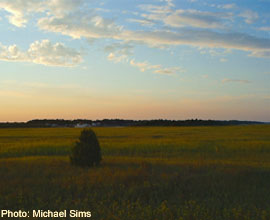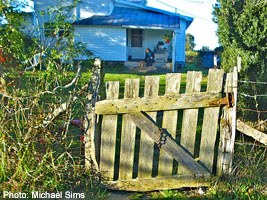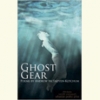After Eudora
In an age of big-box retail and multi-ethnic migration, can a distinctly Southern literature survive?
We were a couple of hours into a marathon talk session, hunched over bar stools, squeezed on all sides by the Beautiful People of Lower Manhattan, when my colleague leaned in earnestly. Suddenly, there it was, The Question:
Is Southern literature dead?
My reflexive response: “No. It’s not dead. But it has a lot of very pale imitators who need to get out of the way.”
 I was perhaps emboldened by the flush of rum and the thrum of this strange, big city. If we just get rid of the magnolia trees, the jugs of sweet tea, the screen doors banging in unison across the land, I said, then we might get back to the heart of the matter. Yet even in my frustration with this tendency, I also sympathize. Well-intentioned writers are fighting hard the homogenization of our culture, and the clichés that now litter Southern fiction are only a sort of shorthand for the otherness that we treasure. It is true, after all, that a friend recently described to me a childhood pasttime which involved “playing church,” where the siblings argued over whose turn it was to preach and whose to be saved. A relative of mine attended a wedding reception not too long ago at which the centerpiece was a whole hog, smoking away in a homemade smoker on a trailerbed still hitched to the pick-up truck. When the owner got mad about something or other, he got in and drove away, pulling the smoking hog on the trailer behind him. (More potato salad, anyone?) These stories are true, and funny, and Southern. But they are also potential fodder for some bad Southern fiction.
I was perhaps emboldened by the flush of rum and the thrum of this strange, big city. If we just get rid of the magnolia trees, the jugs of sweet tea, the screen doors banging in unison across the land, I said, then we might get back to the heart of the matter. Yet even in my frustration with this tendency, I also sympathize. Well-intentioned writers are fighting hard the homogenization of our culture, and the clichés that now litter Southern fiction are only a sort of shorthand for the otherness that we treasure. It is true, after all, that a friend recently described to me a childhood pasttime which involved “playing church,” where the siblings argued over whose turn it was to preach and whose to be saved. A relative of mine attended a wedding reception not too long ago at which the centerpiece was a whole hog, smoking away in a homemade smoker on a trailerbed still hitched to the pick-up truck. When the owner got mad about something or other, he got in and drove away, pulling the smoking hog on the trailer behind him. (More potato salad, anyone?) These stories are true, and funny, and Southern. But they are also potential fodder for some bad Southern fiction.
Part of the problem may be that Southern novelists today seem to be writing from a place of pure love. Tinged with nostalgia, their books are a defensive paean to a certain way of life, one that is slower, family-centered, deliberate. We perhaps identify culturally with Europe, where America’s twin obsessions with work and money are viewed as insanity, and maybe they are. But William Faulkner did not write about the South from a place of pure love. His relationship with Yoknapatawpha was bewildered, often hostile, and his imagery violently beautiful. Did he love Mississippi? I think he must have, to devote his life’s brilliance to it. But it was a complicated love.
 One writer who would recognize this tension is C.E. Morgan, a writer who was educated at Berea College and who still lives in Kentucky. Last year the National Book Foundation named her one of the best writers under 35 in America. If there is a future in Southern literature, she is one of the torchbearers. I read her book, All the Living, with this question about Southern literature in my mind. The novel is set in the 1980s but is timeless in its absence of cultural markers. People drive cars and trucks, but there is no popular music, no television, no current event that ties the book to any particular era.
One writer who would recognize this tension is C.E. Morgan, a writer who was educated at Berea College and who still lives in Kentucky. Last year the National Book Foundation named her one of the best writers under 35 in America. If there is a future in Southern literature, she is one of the torchbearers. I read her book, All the Living, with this question about Southern literature in my mind. The novel is set in the 1980s but is timeless in its absence of cultural markers. People drive cars and trucks, but there is no popular music, no television, no current event that ties the book to any particular era.
It’s a fine novel. We read in the voice of Aloma, an orphan who was brought up in a missionary school and had a talent for piano that was mercifully recognized and nourished. This outlet probably saved her soul. She meets Orren, a farm boy who is going to agricultural college, at a local dance. They have an intense emotional and physical connection. Is this love? When Orren’s family is killed in a car crash, Aloma leaves her school to be with him, but with great misgivings. She wants to see the wider world, and she knows that if she marries and settles, she will be … married and settled. Farm work is hard, and Orren is determined to keep the land through the power of his own muscle. He works from dawn until past dark daily. They are poor. The rain does not come.
When Aloma gets a job playing piano at a local church, she asks Orren to come to services and hear her. Orren rolls over in bed. “Let those other sonsabitches go to church. I got shit to do,” he says, and I laughed out loud in recognition. Orren is many Southern men I have known. The author has clearly known him, too. And she knows about isolation, both geographic and personal, and how it works on people. Whether Aloma and Orren work it out and stay together, or whether she strikes out for the world, is the only question in the book. And yet the manner in which it is resolved, and the depth of feeling and range of considerations Morgan conveys, are remarkable. After all, what greater question do we ever face besides our own mortality? Who we choose to settle with, or not, shapes our lives in infinite ways.
So, yes, it is a fine novel and a Southern novel, one of quite a few that have received critical praise and public welcome in recent years. If Southern literature is dead, where are all these great Southern novels coming from?
 Well, they are coming from the past, because these books are almost uniformly about the past. But it may be a past we wish we had, rather than the one we really do. That past is painful and tangled and, yes, shameful to us because we have been perpetually scolded that if we are Southern we should be ashamed. When I travel, it no longer shocks me how casual people are in their assumptions about my home, a place they have never been. But they are going on old information. That is a topic for another day, relevant here only because our literature can enlighten the rest of the world about who we are today if we will let it. The South today looks, smells, and sounds nothing like the South of Faulkner. Only the most hopeless nostalgists would wish it otherwise. Maybe a certain type of Southern literature died when we all started watching the same TV programs. Maybe it died the day Eudora Welty died, not too long ago, in the same way that the music died with Buddy Holly.
Well, they are coming from the past, because these books are almost uniformly about the past. But it may be a past we wish we had, rather than the one we really do. That past is painful and tangled and, yes, shameful to us because we have been perpetually scolded that if we are Southern we should be ashamed. When I travel, it no longer shocks me how casual people are in their assumptions about my home, a place they have never been. But they are going on old information. That is a topic for another day, relevant here only because our literature can enlighten the rest of the world about who we are today if we will let it. The South today looks, smells, and sounds nothing like the South of Faulkner. Only the most hopeless nostalgists would wish it otherwise. Maybe a certain type of Southern literature died when we all started watching the same TV programs. Maybe it died the day Eudora Welty died, not too long ago, in the same way that the music died with Buddy Holly.
But writing about where you come from and why that matters is not dead and never will be. There is a truly great contemporary Southern novel coming, and it may be written by someone from Mexico, or Laos, or India. Cultural diversity is the untold story of the modern South, and that silence is shameful. The South is still unique, still naturally beautiful, still special in its love of tradition. We are trying to hold on to the right things. But there is room for new things, new voices. The as-yet-unheard and unwritten stories are our future.
Copyright (c) 2010 by Serenity Gerbman. All rights reserved.

